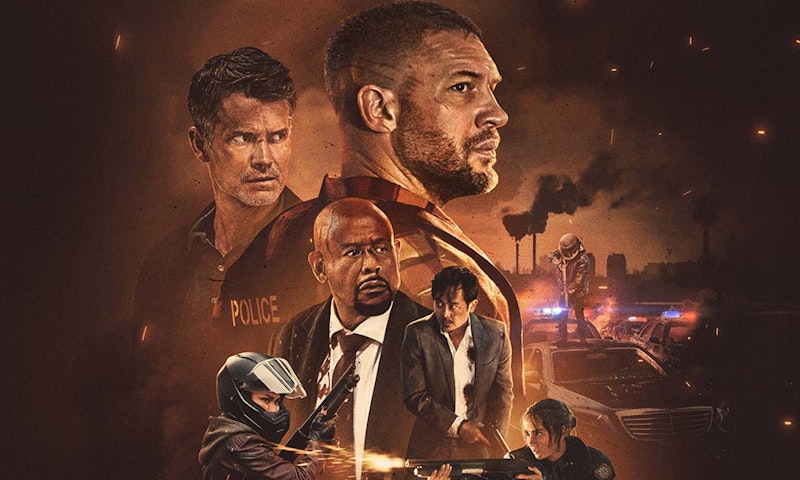The reasons for Havoc’s delay were numerous; the SAG-AFTRA strike prevented the core cast from the reshoots, and Tom Hardy’s press tour for the Venom sequels also added delays. Director Gareth Evans, a perfectionist, seemed reluctant to move forward without a completed script; given his obligations to the AMC crime show Gangs of London, Havoc became an enigmatic entity that existed as only one promotional still for several years. As with most Netflix releases, Havoc was given a date mere months prior to its release, a non-existent marketing campaign, and no theatrical platform. When considering how many studios have scrapped entire productions for the sake of a tax write-off, it's likely that Evans had to strong arm Netflix just to dump the film at the bottom of the streamer’s homepage.
The fanfare that has surrounded Havoc’s release would be justified if it was an experimental work of subversion, but Evans seemed content to make a fairly standard, albeit old-fashioned crime thriller. Set during the Christmas holiday in an ambiguous American city, Havoc centers on Hardy as the homicide detective Patrick Walker, separated from his wife and child for several years. Walker had previously taken down a corruption scheme within the city’s police force, but subsequently found himself under the thumb of the mayoral candidate Lawrence Beaumont, played by a hammy Forest Whitaker. After Beaumont’s son, Charlie (Justin Cornwell), is involved in a cocaine heist, Walker’s assigned to be his protector.
Despite a suitably intense performance from Cornwell, Charlie’s a plot device that each of the warring factions in Havoc vie for. Due to the death of the Chinese gangster Tsui (Jeremy Ang Jones) during the heist, Charlie’s targeted by a ruthless Triad that’s taken control of the criminal underworld. Also involved in the conspiracy are a legion of corrupt cops led by Vincent (Timothy Olyphant), who became an enemy of Walker after the death of an officer during an undercover investigation. To say that Havoc has the logic of a video game isn’t an insult; most of the action scenes involve Walker’s fight against mustache-twirling villains with no regard for collateral damage. Even at their most haphazard, the fight scenes in Havoc have an endpoint with recognizable stakes; should Walker fail to keep Charlie alive, the repercussions would affect his own family’s safety.
Evans’ greatest innovation is his willingness to merge the practical with the preposterous; while the fights performed in Havoc are gleefully pulpy, they’re all grounded within legitimate stunt work performed by martial arts experts. Havoc has a greater presence of computer-generated imagery than The Raid films, as a digital double of Hardy’s likeness is noticeable in the final burst of blood and bullets. Nonetheless, the use of these enhancements doesn’t replace the raw footage, and is used sparingly to augment more explosive moments. There’s also a charm to the restrictions Evans was faced with; it's much easier to forgive a few uneven CGI shots in Evans’ chaotic car chases compared to more polished set pieces in the recent Marvel films.
Evans’ films have never been narratively complex, but he does have the ability to smuggle interesting context within the margins; The Raid 2 can be enjoyed for its death-defying martial arts scenes, but it's also a fairly damning indictment of class inequality in Japan. Havoc is streamlined, as its urban setting is given no distinctive characteristics tied to a specific time or place. Other than the fact that he’s a powerbroker with real estate connections, Beaumont’s political platform is ambiguous, as is the philosophy of the Chinese Triad. The only thematic nuance within the film is a vague idea about a father’s obligation to not pass burdens to his son; Charlie’s crimes and Tsui’s criminal enterprise are their own responsibilities, but they initiate a blood war as a result of who their fathers are.
Havoc’s muted interest in emotional engagement can be forgiven due to the performance by Hardy, which is easily his best since the three films he made with Christopher Nolan in the 2010s. It’s easy to forget that prior to the gimmick of his dual Venom roles, Hardy was considered to be a Brando-esque leading man. Havoc doesn’t offer him many opportunities to do more than grunt and grimace, but Walker’s pervasive annoyance at his continued misfortune adds some dark humor. None of the fights in Havoc are capped off by a quick one-liner, but it's hard to not laugh at the imagination involved in the depth of violence.
More upsetting than Havoc’s streaming exclusivity is its spring release; the near-constant barrage of holiday tunes and festive scenery is enough to put Havoc in the “Christmas action” category alongside Lethal Weapon and Die Hard. Any nitpicks about the structural inconsistencies may be a result of the high standard that Evans has set for himself; when compared to this year’s underwhelming crop of genre films, Havoc is leaps and bounds ahead. Havoc won’t inspire a new wave of action choreography in the same way that The Raid did, but as an unencumbered tribute to John Woo and Shane Black, there isn’t much to complain about.

